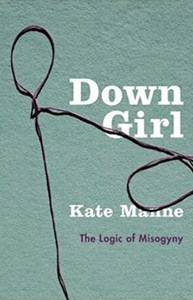Take a photo of a barcode or cover
Awesome read. Points out a bunch of weird confusing contradictions in gender politics, then explains them. Argues that misogyny isn't about hating women - it's about punishing "bad" women. "good" women like subservient housewives, the "cool girlfriend", etc, don't experience misogyny. Women who go against patriarchal norms (e.g. activists, women working in masculine fields, women who don't give men enough attention/emotional labor/sex/etc) experience the kind of "down, girl!" responses that punish them and put them back in their place.
Although it's accessible to a general audience, it's definitely written like a Philosophy Book and aimed at an academic audience. She very formally defines her terms, pre-empts criticism, uses a lot of philosophy jargon, makes a lot of defensive qualifications that are helpful to philosophical reading but might bore an average reader.
Really liked it - its treatment of misogyny as reinforcing certain power structures was awesome. She criticizes the idea of sexism as "not seeing women as people" - the problem is men do see women as people, but people who owe them sex/emotional labor/status (good) but can also be threats, rivals or emasculate them (bad, needs punishment).
Uses lots of literary and political references to support her points, esp. the Trump/Clinton election, Julia Gillard, and Elliot Rodgers, which lends a lot of real-world flavour to a book that sometimes gets a bit academic.
Her background in formal logic and computer science shines through when she talks about the flaws in normal decision-theoretic models of "agents" - as a logic/CS person myself, I found that part really fascinating!
Although it's accessible to a general audience, it's definitely written like a Philosophy Book and aimed at an academic audience. She very formally defines her terms, pre-empts criticism, uses a lot of philosophy jargon, makes a lot of defensive qualifications that are helpful to philosophical reading but might bore an average reader.
Really liked it - its treatment of misogyny as reinforcing certain power structures was awesome. She criticizes the idea of sexism as "not seeing women as people" - the problem is men do see women as people, but people who owe them sex/emotional labor/status (good) but can also be threats, rivals or emasculate them (bad, needs punishment).
Uses lots of literary and political references to support her points, esp. the Trump/Clinton election, Julia Gillard, and Elliot Rodgers, which lends a lot of real-world flavour to a book that sometimes gets a bit academic.
Her background in formal logic and computer science shines through when she talks about the flaws in normal decision-theoretic models of "agents" - as a logic/CS person myself, I found that part really fascinating!
When I was initially recommended this book I wasn’t expecting it to be as heavy. I was expecting this to be a light weekend read and I was wrong. No matter the case it was a well written book on the topic.
My only gripe I had reading The Logic of misogyny is for the first couple chapters I had to constantly reference my dictionary in order to understand what the author was saying. After that point it was a very easy breezy read.
The author provides multiple examples throughout using recent news in the media, stories, and current politics in the last 10 years. With those examples I felt that it made their thesis understandable as well as to provide a new interpretation of those events that I have not considered before.
Content warning: sexual assault, rape, murder
My only gripe I had reading The Logic of misogyny is for the first couple chapters I had to constantly reference my dictionary in order to understand what the author was saying. After that point it was a very easy breezy read.
The author provides multiple examples throughout using recent news in the media, stories, and current politics in the last 10 years. With those examples I felt that it made their thesis understandable as well as to provide a new interpretation of those events that I have not considered before.
Content warning: sexual assault, rape, murder
challenging
informative
slow-paced
challenging
informative
slow-paced
Best book I read all year
informative
slow-paced
There are some excellent points about the logic and function of misogyny in this book. Manne also coins some excellent terms, such as himpathy, and reminds the reader of other (misogynoir) that are both memorable and helpful for remembering some of the key points that she makes. I also really appreciated some of the case studies (both true events and fictional) that she weaves in throughout to illustrate what she’s saying.
Despite some excellent content, for me there was a bit too much internal book referencing (in chapter 2 I’ll speak about, in chapter 8 I’ll unpack this further, as I discussed in chapter 1, etc). This was also a book that relied heavily on academic language. That is not necessarily a negative for every reader (as many readers may enjoy that) nor anything against the author (she IS an academic), but it made it a struggle for me to stay focused in several sections and it will probably keep me from recommending the book to too many others.
Despite some excellent content, for me there was a bit too much internal book referencing (in chapter 2 I’ll speak about, in chapter 8 I’ll unpack this further, as I discussed in chapter 1, etc). This was also a book that relied heavily on academic language. That is not necessarily a negative for every reader (as many readers may enjoy that) nor anything against the author (she IS an academic), but it made it a struggle for me to stay focused in several sections and it will probably keep me from recommending the book to too many others.
informative
medium-paced
challenging
informative
reflective
medium-paced






